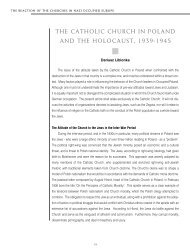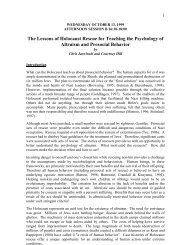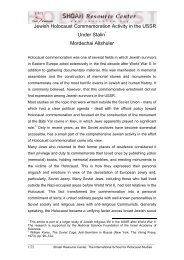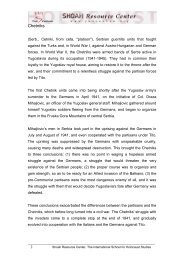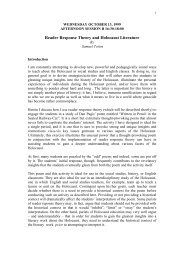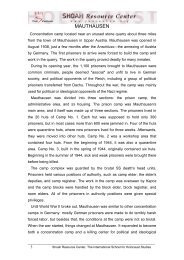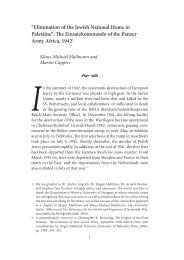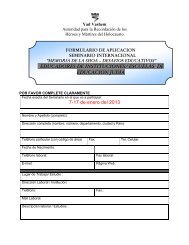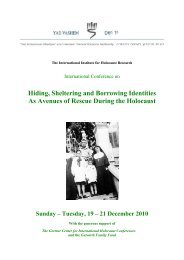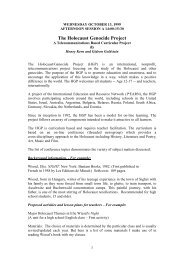Portugal, the Consuls, and the Jewish Refugees ... - Yad Vashem
Portugal, the Consuls, and the Jewish Refugees ... - Yad Vashem
Portugal, the Consuls, and the Jewish Refugees ... - Yad Vashem
You also want an ePaper? Increase the reach of your titles
YUMPU automatically turns print PDFs into web optimized ePapers that Google loves.
<strong>Portugal</strong>, <strong>the</strong> <strong>Consuls</strong>, <strong>and</strong> <strong>the</strong> <strong>Jewish</strong> <strong>Refugees</strong>,1938-1941Avraham MilgramIntroductionThe history of <strong>Portugal</strong> <strong>and</strong> <strong>the</strong> Jews during <strong>the</strong> Holocaust has not yet beensufficiently clarified by ei<strong>the</strong>r <strong>the</strong> Portuguese or <strong>the</strong> Holocaust historiography.Although <strong>the</strong> neutrality of <strong>the</strong> Iberian countries offered a potential haven for aconsiderable number of Jews persecuted by <strong>the</strong> Nazis, <strong>the</strong> excellentPortuguese historiography, published in <strong>the</strong> 1990s about <strong>the</strong> “New State”(Estado Novo), has overlooked this matter 1 — with <strong>the</strong> exception of <strong>the</strong>newspaper reports that described <strong>the</strong> passage of Jews through <strong>Portugal</strong>. 2 In<strong>the</strong> <strong>Jewish</strong> historiography, while <strong>the</strong>re are serious contributions to <strong>the</strong> analysisof this potential haven during <strong>the</strong> Nazi period, 3 <strong>the</strong>y remain few. In <strong>the</strong> case of<strong>Portugal</strong>, one of <strong>the</strong> problems of this historiography, evident in YehudaBauer’s significant work, 4 is <strong>the</strong> discrepancy between <strong>Jewish</strong> <strong>and</strong> Portuguesedocumentation. The past inaccessibility of <strong>the</strong> latter has directly affected <strong>the</strong>results of <strong>the</strong> research.Ano<strong>the</strong>r important contribution is that of Patrick von Zur Mühlen, historian at<strong>the</strong> Friedrich Ebert Stiftung in Bonn, who wrote a book about German1Fern<strong>and</strong>o Rosas, O Estado Novo nos Anos Trinta 1928-1938 (Lisboa:Estampa, 1996); idem., <strong>Portugal</strong> Entre a Paz e a Guerra 1939-1945 (Lisboa:Estampa, 1995); idem., ed., O Estado Novo (1926-1974) (Lisboa: Vega,1991), volume 7 of História de <strong>Portugal</strong>, series editor José Mattoso; AntónioTelo, <strong>Portugal</strong> na Segunda Guerra (1941-1945); <strong>Portugal</strong> e o Estado Novo(1930-1960), vol. XII, Coordenação de Fern<strong>and</strong>o Rosas (Lisboa: Presença,1990).2Irene F. Pimentel, “Refugiados entre portugueses (1933-1945), Vé rtice no.69 (November/ December 1995), pp. 102-111; “Salazar impediu os refugiadosde ‘contagiarem’ <strong>Portugal</strong>” Publico, Saturday, March 18, 1995; See alsoFerreira Fern<strong>and</strong>es, Passagem para a Vida, report in Publico, Sunday, March26, 1995.3In relation to Spain, see <strong>the</strong> definitive study of Haim Avni, SPAIN, <strong>the</strong> Jews,<strong>and</strong> Franco (Philadelphia: The <strong>Jewish</strong> Publication Society of America, 1982).4Yehuda Bauer, American Jewry <strong>and</strong> <strong>the</strong> Holocaust (Detroit: Wayne StateUniversity Press, 1982), pp. 35-55, 197-216.__________________________________________________________________________1/31Shoah Resource Center, The International School for Holocaust Studies
emigration to Spain <strong>and</strong> <strong>Portugal</strong> during 1933-1945. 5 However, in analyzingseveral aspects of this “emigration,” this work, due to its generic outlook, leftseveral gaps in <strong>the</strong> issue regarding refugees.This paper focuses on three aspects of <strong>the</strong> <strong>Portugal</strong>-<strong>Jewish</strong> axis. The firstconcerns Jews persecuted by <strong>the</strong> Nazis from <strong>the</strong> late 1930s until <strong>the</strong>beginning of <strong>the</strong> 1940s. The second concerns António de Oliveira Salazar <strong>and</strong>his ambassadors <strong>and</strong> consuls who became involved in <strong>the</strong> <strong>Jewish</strong> question.And <strong>the</strong> third aspect concerns <strong>the</strong> way <strong>the</strong> consuls dealt with persecutedJews. The analysis of <strong>the</strong> attitude of Portuguese diplomats will form <strong>the</strong>backbone of this article.The first studies of <strong>the</strong> potential haven for Jews offered by Latin Americ<strong>and</strong>iplomats were published forty years ago. 6 However, extensive researchabout <strong>the</strong> diplomats’ involvement in <strong>the</strong> <strong>Jewish</strong> question began only in <strong>the</strong> late1960s, with <strong>the</strong> study of <strong>the</strong> United States <strong>and</strong> <strong>the</strong> Jews during <strong>the</strong>Holocaust. 7 Ano<strong>the</strong>r interesting treatment of this <strong>the</strong>me can be found inpapers that examine <strong>the</strong> h<strong>and</strong>ling of European Jews by Latin Americancountries, mainly Argentina <strong>and</strong> Brazil, based on documentation from officialarchives which opened up to <strong>the</strong> public in <strong>the</strong> late 1980s. 8 Never<strong>the</strong>less, this5Patrick von Zur Mühlen, Fluchtweg Spanien-<strong>Portugal</strong> ― Die DeutscheEmigration und der Exodus aus Europa 1933-1945 (Bonn: Dietz, 1992).6Nathan Eck, “ The Rescue of Jews With <strong>the</strong> Aid of Passports <strong>and</strong>Citizenship Papers of Latin American States, <strong>Yad</strong> <strong>Vashem</strong> Studies, I(Jerusalem, 1957), pp. 125-152; Artur Prinz, “The Role of <strong>the</strong> Gestapo inObstructing <strong>and</strong> Promoting <strong>Jewish</strong> Emigration”, <strong>Yad</strong> <strong>Vashem</strong> Studies, II(Jerusalem, 1958), pp. 205-218.7David S. Wyman, Paper Walls (Amherst: University of MassachusettsPress, 1968), pp. 155-168; Shlomo Shafir, “American Diplomats in Berlin(1933-1939) <strong>and</strong> Their Attitude to <strong>the</strong> Nazi Persecution of <strong>the</strong> Jews,” <strong>Yad</strong><strong>Vashem</strong> Studies, IX (Jerusalem, 1973), pp. 71-105; idem., “George S.Messersmith: Anti-Nazi Diplomat’s View of <strong>the</strong> German-<strong>Jewish</strong> Crisis,” <strong>Jewish</strong>Social Studies, XXXV, 1973, pp.32-41.8Leonardo Senkman, Argentina, la Segunda Guerra Mundial y losRefugiados Indeseables 1933-1945 (Buenos Aires: Grupo EditorLatinoamericano, 1991), pp. 41-58, 88-99, 275-279; Maria Luiz TucciCarneiro, O Antisemitismo na Era Vargas (São Paulo: Brasiliense, 1988), pp.155-348; Avraham Milgram, “The Jews of Europe from <strong>the</strong> Perspective of <strong>the</strong>Brazilian Foreign Service, 1933-1941,” Holocaust <strong>and</strong> Genocide Studies vol.9, no. 1 (Spring 1995), pp. 94-120; Jeffrey Lesser, Welcoming <strong>the</strong>Undesirables (Los Angeles: University of California Press, 1995), pp.118-169;Daniel Feierstein <strong>and</strong> Miguel Galante, “Argentina <strong>and</strong> <strong>the</strong> Holocaust: The__________________________________________________________________________2/31Shoah Resource Center, The International School for Holocaust Studies
historiography remains incomplete since it does not cover all <strong>the</strong> LatinAmerican diplomatic missions.An exception to this pattern is <strong>the</strong> literature dealing with <strong>the</strong> consuls who werehonored as “Righteous Among <strong>the</strong> Nations” by <strong>Yad</strong> <strong>Vashem</strong> for having savedJews while risking <strong>the</strong>ir own lives or careers. Among <strong>the</strong>se consuls, <strong>the</strong> mostfamous is without doubt <strong>the</strong> Swedish Raoul Wallenberg, largely due to hispersonal merits, which came to light during <strong>the</strong> Nazi occupation of Hungary.His mysterious disappearance at <strong>the</strong> end of <strong>the</strong> war, with his arrest by <strong>the</strong>Soviets, also contributed to his fame. By <strong>the</strong> same token, in general, <strong>the</strong>popular literature about <strong>the</strong> deeds of Aristides de Sousa Mendes, SempoSugihara, <strong>and</strong> Giorgiu Perlasca, to name <strong>the</strong> best known, is incomparablylarger than <strong>the</strong> number of scholarly studies. And although <strong>the</strong> researchaddressed <strong>the</strong> diplomatic representation of neutral countries in Hungary in1944-45, little or nothing was done to clarify <strong>the</strong> attitude of Argentinian <strong>and</strong>Turkish representatives in <strong>the</strong> same circumstances. António Louça <strong>and</strong> EvaBan 9 have made an important contribution on <strong>Portugal</strong> <strong>and</strong> Salazar <strong>and</strong> <strong>the</strong>protection granted to Jews in Hungary within <strong>the</strong> context of <strong>the</strong> polemic aboutSalazar’s role vis-à-vis <strong>the</strong> plight of Jews during <strong>the</strong> Holocaust. 10This article will cover <strong>the</strong> period from 1938 to <strong>the</strong> beginning of <strong>the</strong> “FinalSolution.” A second article, spanning <strong>the</strong> period of <strong>the</strong> “Final Solution” inWestern Europe <strong>and</strong> Hungary, is presently being prepared.Salazar <strong>and</strong> <strong>the</strong> <strong>Jewish</strong> Refugee QuestionConceptions <strong>and</strong> Policies of Argentine Diplomacy, 1933-1945”; Moshe Nes-El,“Dos memorias de embajadores latinoamericanos en Europa durante lasegunda guerra mundial," Estudios Sobre el Judaismo Latinoamericano(Jerusalem, 1987), pp. 91-102.9António Louça <strong>and</strong> Eva Ban, “Budapeste, 1944 ― dois diplomatasportugueses face ao Holocausto,” História, ano XVIII (nova série), no.15(December 1995), pp. 24-33; see also Feierstein <strong>and</strong> Galante, “Argentina <strong>and</strong><strong>the</strong> Holocaust.”10João Mendes <strong>and</strong> Clara Viana, “Budapeste, 1944: a embaixada que salvou1000 judeus,” Publico,March 27, 1944; Mena Mendonça, “A verdade sobre aacção diplomatica de <strong>Portugal</strong> na protecção dos judeus na Hungria durante aSegunda Guerra Mundial através dos Ministro Plenipotenciario Carlos deSampayo Garrido e Encarregado de Negócios Carlos Branquinho,” O Dia,July 3, 1944.__________________________________________________________________________3/31Shoah Resource Center, The International School for Holocaust Studies
<strong>Portugal</strong>, apparently, was one of <strong>the</strong> last countries in Europe to confront <strong>the</strong>problem of refugees from Germany <strong>and</strong> Austria. Unlike o<strong>the</strong>r West Europeancountries, <strong>Portugal</strong> did not attract <strong>Jewish</strong> immigrants from Germany <strong>and</strong>Eastern Europe in <strong>the</strong> 1930s. Western Europe, <strong>the</strong> United States, SouthAmerica, <strong>and</strong> even Palestine under <strong>the</strong> British M<strong>and</strong>ate were more attractivethan <strong>Portugal</strong> in economic terms, professional advantages, capacity forabsorption, <strong>and</strong> possibilities for socio-cultural adaptation. Objectively, <strong>Portugal</strong>was not in a position to absorb masses of immigrants, nor did <strong>the</strong> Salazarregime want any foreigners. They were seen as sources both of infiltration ofideas incompatible with <strong>the</strong> “national spirit” <strong>and</strong> of possible social tensions.They were, for <strong>the</strong>se reasons, a priori considered potential enemies of <strong>the</strong>Portuguese authoritarian regime.<strong>Portugal</strong>’s marginality as a welcome country for immigrants was such that <strong>the</strong>Portuguese were not even invited to take part in Evian Conference in July1938, <strong>and</strong> were pushed to <strong>the</strong> sidelines of world efforts on behalf of refugeesfrom Nazism. 11 However, this depreciative attitude would be quicklyreconsidered by Engl<strong>and</strong> <strong>and</strong> <strong>the</strong> United States. 12 At that urgent moment nopower would allow itself to discard territorial options even if <strong>the</strong>y were seen asof little value.The authoritarian regime of Oliveira Salazar, <strong>the</strong> lack of funds in <strong>the</strong>Portuguese treasury, <strong>the</strong> proximity of Spain in <strong>the</strong> midst of a civil war, <strong>and</strong> atiny <strong>Jewish</strong> community that did not exceed 1,000 were all negative factors forany immigrant, especially a <strong>Jewish</strong> one. In spite of this, however, in <strong>the</strong> periodfrom 1933 to <strong>the</strong> end of World War II, a considerable number of Jews passedthrough <strong>Portugal</strong> as <strong>the</strong>y headed for countries overseas. 13 The majority of11Informação ― Resumo ― Parecer, “A Conferencia de Evian,” AMNE(Arquivo do Ministerio dos Negócios Estrangeiros) 2o. P. P. A-47, M-58.12On September 8, 1938, <strong>Portugal</strong> was invited by <strong>the</strong> British to participate in<strong>the</strong> Inter-Governmental Committee created by <strong>the</strong> Evian Conference. Theinvitation was endorsed by <strong>the</strong> American embassy in Lisbon, AMNE, ibid., p.3.13There are several estimates of <strong>the</strong> number of <strong>Jewish</strong> refugees who passedthrough <strong>Portugal</strong>: Yehuda Bauer estimated approximately 40,000 for <strong>the</strong>period 1940-1941; American Jewry <strong>and</strong> <strong>the</strong> Holocaust, p. 48. Haim Avni,based on reports of <strong>the</strong> HICEM from <strong>the</strong> fall of France till <strong>the</strong> end of December1942, points to 10,500 Jews who sailed from Lisbon. This account does not__________________________________________________________________________4/31Shoah Resource Center, The International School for Holocaust Studies
<strong>the</strong>se passed through Lisbon in <strong>the</strong> summer of 1940, evading <strong>the</strong> Nazis <strong>and</strong><strong>the</strong> “blitzkrieg,” which, from April to June, would result in <strong>the</strong> conquest ofcountries in Western Europe.<strong>Portugal</strong> became aware of <strong>the</strong> situation of <strong>the</strong> <strong>Jewish</strong> refugees right after <strong>the</strong>annexation of Austria <strong>and</strong> <strong>the</strong> violent campaign unleashed by <strong>the</strong> SS againstAustrian Jews, which aimed at <strong>the</strong>ir expropriation <strong>and</strong> expulsion from <strong>the</strong>Greater Reich. Viennese Jews became interested in <strong>Portugal</strong> as a country oftransit only when <strong>the</strong> consuls of Holl<strong>and</strong>, Belgium, <strong>and</strong> Switzerl<strong>and</strong> stoppedgranting <strong>the</strong>m visas. The majority of those who received transit visas for <strong>the</strong>secountries did not continue <strong>the</strong>ir journey, preferring to remain in Europe forvarious reasons ― sometimes simply due to lack of funds for <strong>the</strong> trip. 14 Thosewith German or Austrian passports did not need a visa to enter <strong>Portugal</strong> astourists for a period of less than thirty days, an exemption which applied toJews as well. 15 However, <strong>the</strong> tragic days brought about by <strong>the</strong> annexation ofAustria <strong>and</strong> <strong>the</strong> difficulty of obtaining visas to o<strong>the</strong>r countries aroused amongJews such an interest in <strong>Portugal</strong> that <strong>the</strong> consuls in Vienna <strong>and</strong> in o<strong>the</strong>r WestEuropean capitals did not know how to cope with <strong>the</strong> unexpected number ofinterested people. João de Lucena, referring to <strong>the</strong> great number of PolishJews who were in Vienna, warned <strong>the</strong> Portuguese Foreign Ministry that;…almost all <strong>the</strong>se people declared to me that <strong>the</strong>y did not want toremain in <strong>Portugal</strong>, but only to wait in Lisbon for permission to enter <strong>the</strong>US or some South American republic, however <strong>the</strong>y cannot guaranteethat <strong>the</strong>y will obtain that permission within <strong>the</strong> 30 days’ deadline. I fear<strong>the</strong>refore that <strong>the</strong> Portuguese police will have difficulties in getting <strong>the</strong>undesirable elements to leave, for it is probable that <strong>the</strong> authorities of<strong>the</strong> countries through which <strong>the</strong>y would have to return will createinclude those who sailed on <strong>the</strong>ir own; Avni, Spain, <strong>the</strong> Jews, <strong>and</strong> Franco,pp.90-93; p. 236 note 57. This is <strong>the</strong> most precise account. The American<strong>Jewish</strong> Year Book, vol. 46, 1944, mentions that approximately 100,000refugees, most of <strong>the</strong>m Jews, passed through <strong>Portugal</strong>, which contradicts itsown sources, The American <strong>Jewish</strong> Year Book, 42 (1941), where CaptainAgostinho of <strong>the</strong> PVDE (see below) stated that <strong>the</strong>re were 15,000 refugees inAugust 1940.14Letter from <strong>the</strong> consul in Vienna, João de Lucena to <strong>the</strong> MNE on June 15,1938, AMNE 2o. P. P. A-43, M-81.15This was <strong>the</strong> information which hundreds of Jews received at <strong>the</strong>Portuguese consulate in Vienna. João de Lucena to <strong>the</strong> MNE on August 24,1938, AMNE 2o. P. A-43, M-38.__________________________________________________________________________5/31Shoah Resource Center, The International School for Holocaust Studies
difficulties in granting <strong>the</strong>m transit visas, knowing that Pol<strong>and</strong> will notreceive <strong>the</strong>m. 16The ambassador in Berlin, Veiga Simões, suggested to Salazar that <strong>the</strong>yshould inform <strong>the</strong> German government of <strong>the</strong> need for a Portuguese consularvisa in passports stamped with <strong>the</strong> letter J; that is, to Jews who, on leavingGermany, would lose <strong>the</strong> right to return. 17 This suggestion was meant toprevent <strong>the</strong> arrival of Jews without violating <strong>the</strong> existing bilateral agreementbetween <strong>Portugal</strong> <strong>and</strong> Germany. Salazar accepted <strong>the</strong> suggestion <strong>and</strong>instructed consuls <strong>and</strong> shipping companies that <strong>the</strong> Portuguese consular visawas compulsory in <strong>the</strong>se passports. 18The embassy in Brussels requested instructions about granting visas for <strong>the</strong>Portuguese colonies to Jews expelled from Germany. 19 And in Lisbon, AdolfoBenarus 20 resigned from <strong>the</strong> presidency of <strong>the</strong> Portuguese Committee ofAssistance to <strong>Jewish</strong> <strong>Refugees</strong> (COMASSIS), an institution that he hadheaded since 1933. The aging leader, exhausted by years of communityleadership, was unable to cope with <strong>the</strong> wave of refugees arriving in Lisbon in1938.The consuls usually reported to <strong>the</strong> Foreign Ministry about <strong>the</strong> anguishedsituation of Jews so, in 1938, ministers, <strong>the</strong> heads of <strong>the</strong>ir offices, <strong>the</strong> heads ofdepartments, <strong>and</strong> especially Oliveira Salazar, became aware of <strong>the</strong> way <strong>the</strong>Nazis were solving “<strong>the</strong> <strong>Jewish</strong> question.” The dictator’s involvement in <strong>the</strong>issue of <strong>the</strong> <strong>Jewish</strong> refugees was no less than in o<strong>the</strong>r questions vital to <strong>the</strong>16João de Lucena to <strong>the</strong> MNE on June 22, 1938, AMNE 2o. P. A-43, M-38.17Telegram from <strong>the</strong> Berlin embassy to <strong>the</strong> MNE, September 7, 1938, AMNE2o. P. A-43, M-38.18Telegram of <strong>the</strong> MNE to <strong>the</strong> Berlin embassy, September 30, 1938, AMNE2o. P. A-43, M-38.19Letter from Antonio de Seves, head of <strong>the</strong> legation in Brussels to <strong>the</strong> MNE,August 27, 1938, AMNE 2o. P. A-43, M-38.20Adolfo Benarus, one of <strong>the</strong> leaders of <strong>the</strong> <strong>Jewish</strong> community of Lisbon, waspresident of <strong>the</strong> Zionist Federation, founder <strong>and</strong> director of <strong>the</strong> <strong>Jewish</strong> school,wrote books on <strong>Jewish</strong> <strong>and</strong> Zionist issues <strong>and</strong> was in touch with <strong>Jewish</strong>leaders, such as Chaim Weizmann <strong>and</strong> Nahum Goldman. See farewell letterdated April 22, 1941, of Dr. Augusto d’Esaguy, who succeeded AdolfoBenarus in <strong>the</strong> presidency of COMASSIS, Archive of <strong>the</strong> <strong>Jewish</strong> Communityof Lisbon. Central Archives for <strong>the</strong> History of <strong>the</strong> <strong>Jewish</strong> People, Jerusalem,(CAHJP) Po/Li/A-II/12a, 2.__________________________________________________________________________6/31Shoah Resource Center, The International School for Holocaust Studies
future of <strong>Portugal</strong> in <strong>the</strong> 1930s <strong>and</strong> <strong>the</strong> 1940s. The civil war in Spain <strong>and</strong> itspolitical-military implications on <strong>the</strong> Iberian level was <strong>the</strong> historical momentthat paved <strong>the</strong> way for Salazar’s involvement in international affairs. 21 It wasnot by chance that, in 1936, Salazar, who was already head of <strong>the</strong> Council ofMinisters <strong>and</strong> Minister of Finances, also took on <strong>the</strong> functions of minister ofForeign Affairs <strong>and</strong> minister of War.In spite of <strong>the</strong> logistic support that Salazar offered <strong>the</strong> Spanish nationalists,<strong>Portugal</strong> did not regard itself safe from <strong>the</strong> ideological-imperialist threatsbreeding in <strong>the</strong> radical wing of <strong>the</strong> Falangists, who aspired to create a “GreatSpain” that would embrace Portuguese territory. For <strong>the</strong> Germans, <strong>the</strong>nationalist victory predestined <strong>the</strong> fascist superiority over <strong>the</strong> republican,liberal, <strong>and</strong> parliamentarian models. However, <strong>the</strong> German strategicimplications went fur<strong>the</strong>r than might be apparent at first. The ideologicalauthoritarianclimate of <strong>the</strong> Iberian Peninsula on <strong>the</strong> eve of <strong>the</strong> war led <strong>the</strong>Germans to visualize a different Europe, more German than British. 22 Salazarunderstood that intervention of <strong>the</strong> Axis countries in <strong>the</strong> Spanish civil warwould render Portuguese colonial interests vulnerable <strong>and</strong> would upset <strong>the</strong>centuries-old historic alliance between <strong>Portugal</strong> <strong>and</strong> Great Britain.With Salazar’s recognition of <strong>the</strong> need to neutralize <strong>the</strong> Iberian Peninsula <strong>and</strong>distance it from a possible confrontation between <strong>the</strong> two belligerent blocks, 23he began increasing <strong>the</strong> dimensions of <strong>the</strong> Police of Vigilance <strong>and</strong> Defense of<strong>the</strong> State (Polícia de Vigilancia e Defeza do Estado; PVDE), thus enlarging itsinfluence in <strong>the</strong> Portuguese state apparatus. This was <strong>the</strong> case especially for<strong>the</strong> International Section of <strong>the</strong> PVDE, which controlled <strong>the</strong> borders <strong>and</strong> <strong>the</strong>entry of foreigners. 24 21Rosas, ed., O Estado Novo (1926-1974), pp. 295-299.22Fern<strong>and</strong>o Rosas, O Salazarismo e a Aliança Luso-Britânica (Lisbon: Ed.Fragmentos, 1988), pp. 13-49-107-120.23Cesar Oliveira, “A Sobrevivência das Ditaduras e a Neutralidade Peninsularna Segunda Guerra Mundial” in O Estado Novo das Origens ao Fim daAutarcia 1926-1959 (Lisboa: ed. Fragmentos, 1987), pp. 357-366; see also“Oliveira Salazar e a Política Externa Portuguesa: 1932-1968” in Salazar e oSalazarismo (Lisboa: Publicações Dom Quixote, 1989), pp.71-83.24Studies about <strong>the</strong> PVDE are few, <strong>and</strong> <strong>the</strong>ir absence is more evident inmatters referring to <strong>the</strong> admission <strong>and</strong> control of foreigners. From 1933, <strong>the</strong>PVDE became <strong>the</strong> main agent of social <strong>and</strong> political control of <strong>the</strong> regime,__________________________________________________________________________7/31Shoah Resource Center, The International School for Holocaust Studies
From 1935, 25 <strong>the</strong> PVDE, dependent on <strong>the</strong> Ministry of <strong>the</strong> Interior, insisted thata clear <strong>and</strong> rigid policy should dictate <strong>the</strong> granting of visas, especially wherePoles, Russians, Jews, <strong>and</strong> individuals without a recognized nationality wereconcerned. 26 Later, this tendency would increase, due to <strong>the</strong> influence of pro-Germanic <strong>and</strong> antisemitic figures such as Captain Paulo Cumano, chief of <strong>the</strong>Fiscalization Services <strong>and</strong> Borders of <strong>the</strong> International Section of <strong>the</strong> PVDE.Cumano, who had a degree in mining engineering from Berlin, was, it seems,<strong>the</strong> only Portuguese agent who was trained as a policeman in Germany. 27 Hisprivileged position in <strong>the</strong> Section of Portuguese International Police, toge<strong>the</strong>rwith his antisemitism, “certified” in Germany, 28 were pernicious to German <strong>and</strong>Austrian Jews who tried to come to <strong>Portugal</strong>, <strong>and</strong> also created difficulties forseveral consuls who acted according to <strong>the</strong> law.In short, <strong>the</strong> Spanish issue in <strong>the</strong> context of <strong>the</strong> Iberian Peninsula, <strong>the</strong>intervention of <strong>the</strong> Axis countries in <strong>the</strong> civil war, <strong>the</strong> crisis of <strong>Jewish</strong> refugeesin <strong>the</strong> Reich, <strong>the</strong> hypersensitivity of Salazar <strong>and</strong> his regime to <strong>the</strong> entry offoreigners, <strong>and</strong> <strong>the</strong> policy of distancing <strong>Portugal</strong> from <strong>the</strong> European crisis wereall factors in determining <strong>Portugal</strong>’s response to <strong>the</strong> <strong>Jewish</strong> question.The first signs of sensitivity toward <strong>the</strong> Jews were not late in coming. In <strong>the</strong>second half of 1938, consuls in London, Amsterdam, Marseilles, Budapest,<strong>and</strong> Berlin continuously reported on <strong>the</strong> strategy being used to discourageJews from entering <strong>Portugal</strong>. The Portuguese International Police circulatedinfiltrating itself into innumerable areas of national life, trying to detectpotential enemies of <strong>the</strong> regime, especially communists <strong>and</strong> liberals. TomGalagher, “Controlled Repression in Salazar’s <strong>Portugal</strong>,” Journal ofContemporary History, vol. 14 (1979), pp. 385-402. According to DouglasL.Wheeler, <strong>the</strong> PVDE <strong>and</strong>, after 1945, <strong>the</strong> PIDE was a more defensive thanaggressive instrument; he points out that <strong>the</strong> neutralization or destruction of<strong>the</strong> policy of <strong>the</strong> opposition was only one among several police functionswhich it set out to fulfill. Douglas L.Wheeler, “In <strong>the</strong> Service of Order: ThePortuguese Political Police <strong>and</strong> <strong>the</strong> British, German <strong>and</strong> Spanish Intelligence,1932-1945,” Journal of Contemporary History, vol. 18 (1983), p. 2.25Mühlen, Fluchtweg Spanien-<strong>Portugal</strong>, p. 126.26Maria da Conceição Ribeiro, A Polícia Política no Estado Novo 1936-1945(Lisboa: Editorial Estampa, 1995), pp. 94-95.27Wheeler, “In <strong>the</strong> Service of Order,” p. 11.28Maria da Conceição Ribeiro quotes British sources in which Paulo Cumanois described as a Germanophile favoring Nazi racial ideas. See Ribeiro, APolícia Política, p. 119.__________________________________________________________________________8/31Shoah Resource Center, The International School for Holocaust Studies
instructions to shipping companies warning <strong>the</strong>m that unauthorizedpassengers would not be allowed to l<strong>and</strong>. One example is that of a Jew ofPolish origin, Abram J. Lachman, who had a visa granted by Consul AlfredoCasanova in Genoa. This episode was described by <strong>the</strong> director of <strong>the</strong> PVDE:The agency refused to sell him a ticket because <strong>the</strong>y did not haveorders from <strong>the</strong> Portuguese authorities. The consul <strong>the</strong>n phoned <strong>the</strong>shipping company Italia, saying that <strong>the</strong> Pole had permission to enter<strong>Portugal</strong>. The company asked him to put this in writing, <strong>and</strong> <strong>the</strong> consuldid so. The company sold <strong>the</strong> ticket to <strong>the</strong> Polish Jew, but <strong>the</strong>Portuguese police did not let him l<strong>and</strong>. The Pole continued on <strong>the</strong> sameship to America, where he also did not l<strong>and</strong>. He <strong>the</strong>n returned toLisbon, <strong>and</strong> from <strong>the</strong>re to Italy once again, where it was not certainwhe<strong>the</strong>r <strong>the</strong> Italian police would allow his l<strong>and</strong>ing. The Company Italiavia <strong>the</strong>ir agency in Lisbon protested. We answer, saying only that <strong>the</strong>warning about <strong>the</strong> sale of tickets referred to <strong>the</strong> order of <strong>the</strong> police <strong>and</strong>not to that of <strong>the</strong> consulates. 29This episode reflects <strong>the</strong> efforts of <strong>the</strong> PVDE to impose its discipline onconsuls <strong>and</strong> shipping companies so that <strong>the</strong>y would obey <strong>the</strong> orders of <strong>the</strong>International Police.The perplexity regarding <strong>the</strong> situation was shared by consuls <strong>and</strong> victimsalike. The consuls, because <strong>the</strong>y were <strong>the</strong> last ones to know about <strong>the</strong>scheme being plotted in Lisbon by Salazar, <strong>the</strong> minister of <strong>the</strong> Interior, <strong>and</strong> <strong>the</strong>PVDE to prevent <strong>the</strong> disorganized arrival of Jews, <strong>and</strong> <strong>the</strong> Jews, because<strong>the</strong>y did not underst<strong>and</strong> why <strong>the</strong>y were denied passage while <strong>Portugal</strong>granted visas to German <strong>and</strong> Austrian passports. 30 From this one can inferthat, at least until October 1938, <strong>the</strong>re were no official guidelines preventingJews from entering <strong>Portugal</strong>. However, in order to hinder <strong>the</strong> haphazard entry29Letter from <strong>the</strong> Director of <strong>the</strong> PVDE to <strong>the</strong> Secretary-General of <strong>the</strong> MNE,Lisbon, October 18, 1938, AMNE 2o. P. A-43, M-73.30Telegram from Ambassador Veiga Simões, Berlin, September 27, 1938,AMNE 2o. P. A-43, M-38; Letter from General Consul M. de Castro, London,September 20, 1938, AMNE 2o. P. A-43, M-38a; Letter from Vice-ConsulJoaquim de Souza Cordeiro in Amsterdam, October 4, 1938, AMNE 2o. P. A-43, M-38a; Letter from Consul Jose Augusto Magalhães in Marseilles,October 21, 1938, AMNE 2o. P. A-43, M-38a; Letter from Consul Vasco daGama Santos in Budapest, October 16, 1938, AMNE 2o. P. A-43, M-38.__________________________________________________________________________9/31Shoah Resource Center, The International School for Holocaust Studies
of <strong>the</strong>se refugees, <strong>the</strong> police had begun to apply Salazar’s orders <strong>and</strong> <strong>the</strong>verbal instructions transmitted by <strong>the</strong> minister of Interior. 31The purpose of <strong>the</strong> above stratagem, as applied by <strong>the</strong> PVDE, was to preventrefugee Jews from staying indefinitely in <strong>Portugal</strong>. From <strong>the</strong>n on, <strong>and</strong>according to circular number 10 of October 28, 1938, addressed to consularrepresentations, settling in <strong>Portugal</strong> was forbidden to Jews; however, <strong>the</strong>ywere allowed entry as tourists for thirty days. 32 Ansgar Schäfer, in apreliminary article, has discussed <strong>the</strong> various decrees issued by <strong>the</strong> ForeignMinistry during this period. 33 Patrick von Zur Mühlen has asserted thatPortuguese policy was not determined by antisemitic reasons but ra<strong>the</strong>r byfactors of <strong>Portugal</strong>’s internal <strong>and</strong> external policy. 34The above-mentioned decree became a basic guideline for <strong>the</strong> transit of Jewsthrough <strong>Portugal</strong> <strong>and</strong> Spain until <strong>the</strong> end of World War II. It is worth noting that<strong>the</strong> Portuguese <strong>and</strong> Spanish models relative to <strong>the</strong> entry of foreigners werevery similar; <strong>the</strong> difference between <strong>the</strong>m was more noticeable in <strong>the</strong>treatment offered <strong>the</strong> refugee. <strong>Portugal</strong> was, from <strong>the</strong> beginning, more liberal<strong>and</strong> less violent than Spain. 35 As permanent residence in <strong>Portugal</strong> wasforbidden, obtaining documents to enter <strong>and</strong> leave <strong>the</strong> country was a sine quanon condition for any refugee. Besides <strong>the</strong> money to buy sea passage, it wasfirst necessary to get an exit visa from Vichy French territory, an entry visa toan overseas country or countries, usually on <strong>the</strong> American continent, <strong>and</strong> aPortuguese visa, so that finally a transit visa through Spain could be received.31Letter from <strong>the</strong> Secretary-General of <strong>the</strong> Ministry of <strong>the</strong> Interior, Mario CaesEsteves, to <strong>the</strong> MNE on September 30, 1938, AMNE 2o. P. A-43, M-38.32This is <strong>the</strong> content of <strong>the</strong> letter signed by <strong>the</strong> Secretary-General of <strong>the</strong>PVDE, Jose Catela, to <strong>the</strong> Secretary-General of <strong>the</strong> MNE on October 27,1938, AMNE 2o. P. A-43, M-38.33Ansgar Schäfer, “Obstáculos no caminho para a liberdade,” in Aspectos eTendências de Estudos Germanísticos em <strong>Portugal</strong>, Lisboa, December 1992,pp. 85-94.34Mühlen, Fluchtweg Spanien-<strong>Portugal</strong>, p. 129. Had <strong>the</strong> book not been soclearly apologetic, presenting <strong>Portugal</strong> as a country welcoming refugees, wewould have had no reason to distrust <strong>the</strong> categorical tone of this statement.35Avni, SPAIN, <strong>the</strong> Jews, <strong>and</strong> Franco, pp. 72-79.__________________________________________________________________________10/31Shoah Resource Center, The International School for Holocaust Studies
36 For someone requesting visas, this metaphoric via Dolorosa symbolized <strong>the</strong>anguish of being a refugee.The arrival <strong>and</strong> departure of <strong>the</strong>se people would be controlled by <strong>the</strong>International Section of PVDE, which followed every step of <strong>the</strong> process, incompliance with <strong>the</strong> wishes of Oliveira Salazar. The foreign minister <strong>and</strong> <strong>the</strong>consular representations would adapt <strong>and</strong> submit <strong>the</strong>mselves quickly to thisreality.In <strong>the</strong>ir urgency to ab<strong>and</strong>on <strong>the</strong> Greater Reich <strong>and</strong> o<strong>the</strong>r antisemitic countriessuch as Pol<strong>and</strong>, Rumania, <strong>and</strong> Hungary, <strong>the</strong> Jews besieged consulates ofseveral countries, searching for <strong>the</strong> emancipating visa mainly to North <strong>and</strong>South America. In comparing <strong>the</strong> attitudes of <strong>the</strong> consular agents of Brazil,Argentina, <strong>and</strong> <strong>the</strong> United States with those of <strong>the</strong> Portuguese consuls, wenotice <strong>the</strong> almost complete lack of Portuguese antisemitic prejudice — whichwas almost sui generis among consular services of that period. The Braziliannegative attitude was far to <strong>the</strong> opposite pole. 37 The full range of attitudesamong <strong>the</strong> Argentinean consuls has not yet been verified, but <strong>the</strong>re arealready some serious contributions on <strong>the</strong> subject. Leonardo Senkman hasdescribed some negative cases of <strong>the</strong> Argentinean consular corps inGermany, as opposed to empathic attitudes to Jews expressed by membersof <strong>the</strong> consular corps in Bucharest <strong>and</strong> Sofia. 38 In a recent study, focusing oninformation sent by Argentinean consuls from Germany, Bulgaria, Italy, <strong>and</strong>Rumania, <strong>and</strong> <strong>the</strong> nature of <strong>the</strong>ir attitudes during <strong>the</strong> persecutions of Jews, wefind a dichotomous reality of both antisemitism <strong>and</strong> philo-Semitism. 39 David36António Louçã, “<strong>Portugal</strong>, Double Game, Between <strong>the</strong> Nazis <strong>and</strong> <strong>the</strong>Allies,” in Avi Becker, ed., Challenging European History: The Plunder of<strong>Jewish</strong> Property During <strong>the</strong> Holocaust (London: Macmillan, forthcoming).37Several studies were published in <strong>the</strong> last ten years about Brazil <strong>and</strong> <strong>the</strong>issue of <strong>the</strong> <strong>Jewish</strong> refugees during <strong>the</strong> 1930s <strong>and</strong> 1940s. Without taking intoaccount <strong>the</strong> historiographic differences, <strong>the</strong>se studies reflect <strong>the</strong> negative <strong>and</strong>deeply antisemitic attitude of <strong>the</strong> majority of <strong>the</strong> consuls serving in Europe.Maria Luiza Tucci Carneiro, O Anti-Semitismo na Era Vargas (São Paulo:Brasiliense, 1988), pp.155-247; Avraham Milgram, “The Jews of Europe from<strong>the</strong> Perspective of <strong>the</strong> Brazilian Foreign Service, <strong>and</strong> Os Judeus do Vaticano,”( Rio de Janeiro: Imago, 1994), pp. 107-124. Lesser, Welcoming <strong>the</strong>Undesirables.38Senkman, Argentina, la Segunda Guerra Mundial, pp. 41-58.39Feierstein <strong>and</strong> Galante, “Argentina <strong>and</strong> <strong>the</strong> Holocaust.”__________________________________________________________________________11/31Shoah Resource Center, The International School for Holocaust Studies
S.Wyman, in his classic Paper Walls, presents an eclectic variety of attitudestaken by American consuls in relation to refugees ― Jews <strong>and</strong> non-Jews. Andin spite of <strong>the</strong> critical tone evident in <strong>the</strong> book, <strong>the</strong> general picture of <strong>the</strong>consuls is more positive than negative. Except for some cases of extremeintransigence, most of <strong>the</strong>m collaborated with aid organizations (Quakers,Unitarian Service, American Friends Service Committee, etc.) <strong>and</strong> empathizedwith <strong>the</strong> cause of <strong>the</strong> refugees. 40The policy of <strong>the</strong> American states <strong>and</strong> <strong>the</strong> attitude of <strong>the</strong>ir consuls was vital,since obtaining a Portuguese visa <strong>and</strong> transit through Spain was dependanton <strong>the</strong>ir being a final haven. The importance of <strong>the</strong> Portuguese consuls can bemeasured by <strong>the</strong>ir courage to help Jews deprived of visas to o<strong>the</strong>r countries,in <strong>the</strong> first stage, <strong>and</strong> by <strong>the</strong>ir strategic positions, as neutral consular agents,in <strong>the</strong> stage of deportations to <strong>the</strong> extermination camps.A Paragon of Ambivalence-Ambassador Alberto daVeiga Simões 41Veiga Simões began his consular <strong>and</strong> diplomatic career with <strong>the</strong>establishment of <strong>the</strong> republic; he was foreign minister for a short time in 1921.During this period he absorbed liberal <strong>and</strong> democratic ideas, a fact which, at40Wyman, Paper Walls, pp. 155-168.41Alberto da Veiga Simões was born on December 16, 1888, in Arganil.From an early age he showed his literary skills, writing short stories <strong>and</strong>essays on political issues for local newspapers. He studied law at <strong>the</strong>University of Coimbra, receiving his diploma in 1910. Till he entered <strong>the</strong>consular corps in 1915, Alberto da Veiga Simões practiced law <strong>and</strong> was alsoinvolved in <strong>the</strong> politics of Arganil, aspiring to become a national figure. Hisrepublican leanings led him to become a journalist, writing for <strong>the</strong> weekly of<strong>the</strong> Centro Republicano Evolucionista [Evolutionary Republican Center] in hiscity, having been invited by Antonio José de Almeida, president of <strong>the</strong> CentralCommittee of <strong>the</strong> Evolutionary Party, to become <strong>the</strong> political editor of itsorgan: República. See Neves, ed., Veiga Simões, Vida e Obra (Arganil:Publication of <strong>the</strong> City Council, 1988). This study, published in his memory<strong>and</strong> <strong>the</strong>refore apologetic, is clearly anti-authoritarian. "Today we can no longerdoubt: <strong>the</strong> memory of Veiga Simões has not been respected with <strong>the</strong> attentionit deserves, for reasons whose roots are clearly political. Who knows ifunconsciously, but <strong>the</strong> truth is that <strong>the</strong> political struggles in which he becameinvolved in <strong>the</strong> early years of <strong>the</strong> Republic increased later, during <strong>the</strong> longyears of authoritarianism which followed 1926, as if it were a crime to be ademocrat." p. 13.__________________________________________________________________________12/31Shoah Resource Center, The International School for Holocaust Studies
<strong>the</strong> end of <strong>the</strong> republic, 42 would create serious problems <strong>and</strong> lead to <strong>the</strong> endof his diplomatic career. In August 1933, after long years of service, VeigaSimões was appointed ambassador to Germany. His antagonism to Hitler’spolicy <strong>and</strong> ideology <strong>and</strong> to <strong>the</strong> mystic zeal of <strong>the</strong> Nazi pseudo-religionincreased with time, <strong>and</strong> this emerges in <strong>the</strong> long <strong>and</strong> frequent reports he sentto Salazar. For Veiga Simões, <strong>the</strong> German imperialistic rhetoric breached <strong>the</strong>limits of <strong>the</strong> norms ruling relationships between nations in <strong>the</strong> modern state.He witnessed <strong>the</strong> way in which <strong>the</strong> German Reich introduced new <strong>and</strong>threatening elements into <strong>the</strong> state, especially <strong>the</strong> concept of “Volk [which is a]dynamic assimilator of all <strong>the</strong> analogous elements that fall within <strong>the</strong> range ofits functioning, <strong>and</strong> [are] in constant movement.” 43 He understood clearly that<strong>the</strong> cult of <strong>the</strong> state, <strong>the</strong> subordination of <strong>the</strong> family unit to totalitarianguidelines, <strong>the</strong> disintegration of religious orders, <strong>and</strong> <strong>the</strong> gradual destructionof minorities would all produce a dangerous amorphous mass.In fact, <strong>the</strong> Third Reich’s eliminatory zeal regarding all <strong>the</strong> religiousdenominations ― Jews, Catholics, Lu<strong>the</strong>rans of all kinds ― has onesource <strong>and</strong> one end: to substitute all <strong>the</strong> religious truths of human <strong>and</strong>universal order that share a faith that joins <strong>the</strong>m to all of mankind, witha religiosity exclusively oriented to <strong>the</strong> Germanic community, its mysticroots, its traditions, its future power. 44Veiga Simões frequently used irony <strong>and</strong> cynicism to express his contempt forGerman anti-humanism, which, within Portuguese governmental circles,greatly contributed to his image as an enemy of <strong>the</strong> Reich. However, <strong>and</strong>perhaps paradoxically, his attitude toward <strong>the</strong> persecuted Jews involved adistancing <strong>and</strong> an ambivalence: alienation in relation to <strong>the</strong> majority of <strong>Jewish</strong>victims of Nazism <strong>and</strong> hypersensitivity in relation to some Jews, usually those42Cesar Mendes, twin bro<strong>the</strong>r of Aristides de Sousa Mendes, became anuncompromising enemy of Veiga Simões in <strong>the</strong> mid-1920s, <strong>and</strong> all <strong>the</strong> moreso when he was nominated minister of <strong>the</strong> MNE by Salazar. Mendes pursuedVeiga Simões so as to remove him from <strong>the</strong> ministry due to his republicanpast. See Rui Afonso, Injustiça. O Caso Souza Mendes (Lisboa: EditorialCaminho, 1990), pp. 193-197; Um Bom Homem. Aristides Sousa Mendes o“Wallenberg Português,” (Lisboa: Editorial Caminho, 1995), p. 18.43Veiga Simões to Salazar, Berlin, March 29, 1937, AMNE 3o. P. A-11, M-34.44Ibid.__________________________________________________________________________13/31Shoah Resource Center, The International School for Holocaust Studies
of great wealth, great renown <strong>and</strong> well-connected with <strong>the</strong> Portuguesediplomatic corps in Germany.The antisemitism unleashed in 1938, culminating in <strong>the</strong> notorious“Kristallnacht” pogrom, aroused Veiga Simões’ concern with regard to threeaspects related to <strong>the</strong> persecution of Jews:He feared a mass emigration to <strong>Portugal</strong> of Jews deprived of funds who wouldremain <strong>the</strong>re for lack of any immigrant options. He systematically warnedSalazar of this “danger” <strong>and</strong> proposed a series of measures to prevent suchan event. 45He tried to ensure that consuls retain <strong>the</strong> exclusive right to grant or refusevisas, a right which was being systematically undermined by <strong>the</strong> PVDE withSalazar’s connivance.He tried to protect certain Jews against <strong>the</strong> wishes of <strong>the</strong> PVDE, deliberatelyoverlooking <strong>the</strong> warnings by <strong>the</strong> police <strong>and</strong> justifying himself to Salazar for <strong>the</strong>visas issued to people in whom he was interested.After Kristallnacht <strong>the</strong> dem<strong>and</strong> for Portuguese visas intensified. Many visaswere authorized by <strong>the</strong> PVDE itself in Lisbon through formal requests byPortuguese residents <strong>and</strong> <strong>the</strong>n issued to those concerned at <strong>the</strong> consulates inGermany. An identical situation occurred in <strong>the</strong> Brazilian consulates ―contrary to <strong>the</strong> wishes of Ambassador Ciro de Freitas Valle. 46 This reality offaits accomplis, his power-struggle with <strong>the</strong> PVDE’s <strong>and</strong> <strong>the</strong> consequentlessening of his own prerogatives as head of <strong>the</strong> Legation, motivated Veiga45Entry to <strong>Portugal</strong> to be conferred to holders of German passports markedwith a J, “only if: a) <strong>the</strong>y have relatives who are already resident in <strong>Portugal</strong>,<strong>and</strong> able to pay for <strong>the</strong>ir upkeep (especially in <strong>the</strong> case of old people, women<strong>and</strong> minors) ; b) gave sufficient guarantees that <strong>the</strong>y possessed funds <strong>and</strong>could continue <strong>the</strong>ir journey to ano<strong>the</strong>r country, <strong>the</strong> Portuguese territoryserving only as transit or a short stay, for a period of time to be decided ineach individual case by <strong>the</strong> proper authorities in Lisbon, a period which couldbe prolonged till <strong>the</strong>y settled down if <strong>the</strong> authorities were to decide that thiswas convenient <strong>and</strong> <strong>the</strong> interested party wished it; c) <strong>the</strong> people involved areon a high scientific or technical level, of recognized merit, a case which isprobably very rare; d) <strong>the</strong> people involved gave all <strong>the</strong> guarantees of socialrespectability, <strong>and</strong> of not being able to undertake activities which competingwith local ones would harm <strong>Portugal</strong>’s economy or certain of its classes”;Veiga Simões to Salazar, Berlin, March 29, 1937, AMNE 2o. P. A-43, M-38.46Milgram, Os Judeus do Vaticano, pp. 115-116__________________________________________________________________________14/31Shoah Resource Center, The International School for Holocaust Studies
Simões to grant visas to Jews without prior authorization by <strong>the</strong> Portuguesepolice. The number of authorized visas without prior consultation which headvocated was considerably reduced, but was still high enough for him to bereprim<strong>and</strong>ed by Salazar. 47 In this context he authorized <strong>the</strong> visa to RudolfKissinger, son-in-law of <strong>the</strong> Portuguese consul in Nuremberg, a businessmanwith a record number of visits to Lisbon. In <strong>the</strong> case of Siegfried Dankowitz, exvice-director of an important Austrian bank, who wanted to spend six monthsin <strong>Portugal</strong> before re-emigrating to Australia, 48 <strong>the</strong> visa contradicted <strong>the</strong> spiritof circular no. 10 of October 1938.Of special interest are <strong>the</strong> three cases which Veiga Simões advocated toSalazar because <strong>the</strong>y were paradigmatic of his sensitivity to Jews belongingto <strong>the</strong> former high German society <strong>and</strong> close to <strong>the</strong> circle of his own personalrelations.Dr. Edmund Werner, personal doctor of several diplomats in Berlin <strong>and</strong> whowas recommended by <strong>the</strong> secretary-general of <strong>the</strong> Anti-Komintern, wanted tosettle down in Madeira Isl<strong>and</strong> to establish a convalescent home.Madame Deutsch, former owner of <strong>the</strong> house bought for <strong>the</strong> PortugueseLegation, was an elderly lady with a big fortune abroad who lived part of <strong>the</strong>year in Italy. “The capital which she possesses abroad is very great <strong>and</strong>ensures her a very comfortable life. It’s a case which need not be seen as anemigration of Jews, but ra<strong>the</strong>r as tourism <strong>and</strong> rich tourism at that.” 493. Prof. Dr. Hermann Strauss had taught several Portuguese doctors<strong>and</strong> for that reason:when he saw his position reduced to <strong>the</strong> present one, forbidden fromtreating Aryans, from using his car, etc. thought of settling down in<strong>Portugal</strong>….I promised him in due time an unlimited visa for <strong>Portugal</strong>, or <strong>the</strong>47“The Police informs consulate in Berlin is granting visas, passports, GermanJews without prior consultation Portuguese police. Chancellor of <strong>the</strong>Consulate also gives declarations to those interested that it has no objectionsto <strong>the</strong>ir coming to <strong>Portugal</strong>. I beg Your Excellency to order <strong>the</strong> immediate stopof <strong>the</strong>se procedures. signed Minister.” Telegram of Salazar to Veiga Simões,December 21, 1938, AMNE 2o. P. A-43, M-38.48Veiga Simões to Salazar, Berlin January 14, 1939, AMNE 2o. P. A-43, M-38-A.49Veiga Simões to Salazar, Berlin December 31, 1938, AMNE 2o. P. A-43,M-38.__________________________________________________________________________15/31Shoah Resource Center, The International School for Holocaust Studies
isl<strong>and</strong>s….I did it without <strong>the</strong> request of strangers because my reasonrefused to conceive that a civilized country would close its gates to one of<strong>the</strong> world’s most famous practitioners of clinical medicine simply for socalledracial reasons. 50At <strong>the</strong> end of <strong>the</strong> letter, after relating <strong>the</strong>ir case histories <strong>and</strong> insisting on <strong>the</strong>well-being <strong>and</strong> future of <strong>the</strong> three Jews from <strong>the</strong> elite ― <strong>and</strong> even appealing to<strong>the</strong> humanitarian feelings of Salazar ― Veiga Simõesfearfully <strong>and</strong>apprehensively warned <strong>the</strong> dictator of <strong>the</strong> eventual arrival of Czech Jews[from <strong>the</strong> annexed Sudetenl<strong>and</strong>], armed with passports, but without <strong>the</strong> red J,which would render difficult <strong>the</strong> “racial” identification of <strong>the</strong> holders. 51 For <strong>the</strong>ambassador, famous, wealthy, <strong>and</strong> persecuted Jews were victims, while <strong>the</strong>persecuted <strong>and</strong> dispossessed masses were Jews. Never<strong>the</strong>less, hiscorrespondence ― dictated by his liberal-democratic leanings toge<strong>the</strong>r withhis anti-Nazism ― is free of hatred, racism, or antisemitism.The consul general in Hamburg granted visas to Jews on his own initiative<strong>and</strong> with <strong>the</strong> approval of Veiga Simões, <strong>and</strong>, by establishing direct contactswith <strong>the</strong> civilian governors of <strong>the</strong> Azores <strong>and</strong> Madeira, enabled <strong>the</strong> admissionof Jews. 52 Thus he bypassed <strong>the</strong> PVDE, <strong>the</strong> MNE, <strong>and</strong> <strong>the</strong> minister (Salazar).Veiga Simões <strong>and</strong> <strong>the</strong> consul general in Hamburg experienced severaldifficulties. First, <strong>the</strong> tendency of <strong>the</strong> PVDE to centralize <strong>and</strong> controlimmigration, dem<strong>and</strong>ing <strong>the</strong> subordination of ambassadors <strong>and</strong> consuls, evenat <strong>the</strong> price of <strong>the</strong> loss of <strong>the</strong>ir prestige. For example, a letter from <strong>the</strong> PVDE,signed by Captain Paulo Cumano <strong>and</strong> addressed to <strong>the</strong> Marcus <strong>and</strong> Harting50Ibid. The PVDE authorized <strong>the</strong> arrival of <strong>the</strong>se people as tourists during aperiod of thirty days, that is, within <strong>the</strong> limits established by <strong>the</strong> decree ofOctober 10, 1938, <strong>and</strong> also as a show of authority. Letter of <strong>the</strong> PVDE to <strong>the</strong>General Director of Political Affairs <strong>and</strong> Internal Administration of <strong>the</strong> MNE,Lisbon, March 3, 1939, AMNE 20. P. A-43, M-38-A.51Three days later, on January 17, 1939, he again warned <strong>the</strong> MNE aboutvisas authorized by <strong>the</strong> PVDE to Jews lacking funds <strong>and</strong> proof of <strong>the</strong>ir beingable to go on to o<strong>the</strong>r countries. Telegram of January 17, 1939, AMNE, 2o. P.A-43, M-38.52Confidential letter of Paulo Cumano to <strong>the</strong> Secretary-General of <strong>the</strong> MNE,Lisbon, April 11, 1939, AMNE 2o. P. A-43, M-38-A. The consul addressed <strong>the</strong>Civil Governor of Ponta Delgada asking for authorization for twenty-eight<strong>Jewish</strong> families to l<strong>and</strong>.__________________________________________________________________________16/31Shoah Resource Center, The International School for Holocaust Studies
firm of Lisbon, was presented in <strong>the</strong> Hamburg consulate declaring that“residence in <strong>Portugal</strong> having been authorized to a certain person, a ticket to<strong>Portugal</strong> may be sold to him, independently of <strong>the</strong> consular visa.” 53 In April1939, Mrs. Franziska Elisabeth Deutsch, mentioned above, widow of <strong>the</strong>president of <strong>the</strong> AEG industry, did not yet have her visa authorized by <strong>the</strong>International Police. Embarrassed <strong>and</strong> discredited, Veiga Simões ordered <strong>the</strong>consul in Hamburg to stamp her passport with <strong>the</strong> visa, even without <strong>the</strong>authorization of <strong>the</strong> PVDE, <strong>and</strong> appealed to Salazar not to hinder <strong>the</strong> l<strong>and</strong>ingof Mrs. Deutsch:Your Excellency, to defend <strong>the</strong> prestige of <strong>the</strong> Portuguese diplomaticrepresentation, you will of course give <strong>the</strong> Police incisive orders toplace no difficulties to her l<strong>and</strong>ing in Lisbon, <strong>and</strong> this time to abstainfrom undermining <strong>the</strong> authority of <strong>the</strong> diplomatic <strong>and</strong> consularrepresentatives vis-à-vis all of Berlin, as <strong>the</strong>y have done in o<strong>the</strong>r cases.54The second reason is more serious. It refers to <strong>the</strong> critical attitude of VeigaSimões toward <strong>the</strong> German regime, which was not backed by <strong>the</strong> Ministry ofForeign Affairs <strong>and</strong> even less so by <strong>the</strong> PVDE. However, what was bearableuntil <strong>the</strong> collapse of France, which brought Hitler’s troops to <strong>the</strong> Pyrenees, hadbecome intolerable from <strong>the</strong> point of view of diplomacy <strong>and</strong> <strong>the</strong> efforts atneutrality that Salazar desired. Nobody, <strong>the</strong>refore, was surprised when VeigaSimões was substituted by <strong>the</strong> pro-Germanic Count of Tovar on July 31,1940. On his return, Veiga Simões was investigated; <strong>the</strong> information ga<strong>the</strong>redabout him clarifies <strong>the</strong> fate of <strong>the</strong> circle of those who were personae nongratae to Salazar:I don’t think that at this moment he can be a disturbing element sincehe lacks followers, <strong>and</strong> given his long absence from <strong>the</strong> country. Inspite of his sympathy for <strong>the</strong> cause of <strong>the</strong> so-called democracies I don’tbelieve he has any kind of links with <strong>the</strong>ir representatives.Never<strong>the</strong>less, he does not hide his faith in parliamentarism, saying tha<strong>the</strong>re one notices immediately <strong>the</strong> lack of liberty <strong>and</strong> that without53Veiga Simões to <strong>the</strong> Minister of Foreign Affairs (Salazar), Berlin, May 4,1939, AMNE, 2o. P. A-43, M-38-A.54Veiga Simões to Salazar, Berlin, April 8, 1939. AMNE, 2o. P. A-43, M-38-A.__________________________________________________________________________17/31Shoah Resource Center, The International School for Holocaust Studies
freedom of <strong>the</strong> press one cannot carry out a constructive <strong>and</strong> honestenterprise. 55Veiga Simões was “frozen” after his return until February 1946, when he wasappointed <strong>the</strong> representative of <strong>Portugal</strong> to <strong>the</strong> China of Chiang Kai-Shek.After <strong>the</strong> long years of hibernation, he felt this new post degraded him, <strong>and</strong>,when he did not take it up, Salazar decreed that he be discharged. 56Salazar, who did not tolerate any opposition <strong>and</strong>, still less, any disregard ofhis authority, had a special ability to undo undisciplined subordinates whoacted as circumstances <strong>and</strong> <strong>the</strong>ir consciences dictated: he ostracized <strong>the</strong>m.For <strong>the</strong>se reasons he punished Veiga Simões, avenged himself on AristidesMendes, <strong>and</strong> humiliated Sampayo Garrido, head of <strong>the</strong> Portuguese Legationin Budapest.The Incredible Lightness of Disobedience - Aristides de SousaMendesAristides de Sousa Mendes, <strong>the</strong> consul whose memory was officially omittedfor years, appears today next to o<strong>the</strong>r immortal diplomats who saved Jewsduring World War II. 57 Sousa Mendes was prosecuted for disobeying ordersthat forbid <strong>the</strong> entry of certain kinds of foreigners, mostly Jews. On beingprosecuted, reviled, <strong>and</strong> discharged from his consular functions, he lost hispension ― a situation that ruined him financially. In 1938, after nine years in<strong>the</strong> consulate general at Antwerp, he was appointed to <strong>the</strong> inferior consularpost at Bordeaux. Here his personal drama played itself out.His problems began before <strong>the</strong> great exodus of refugees to <strong>the</strong> south ofFrance. The process that ended with Sousa Mendes’s discharge from hisconsular career began with two visas that he granted to “undesirable”55Unsigned information to Salazar, dated May 8, 1941, A.N.T.T. OliveiraSalazar Archive AOS/CO/IN-8 B56Neves, ed., Veiga Simões, Vida e Obra, p. 8.57The road to his rehabilitation in <strong>Portugal</strong> started in Jerusalem, whichdistinguished him in 1967, with <strong>the</strong> noble title of “Righteous Among <strong>the</strong>Nations” conferred by <strong>Yad</strong> <strong>Vashem</strong>.__________________________________________________________________________18/31Shoah Resource Center, The International School for Holocaust Studies
foreigners 58 without having been authorized to do so. The first case was onNovember 21, 1939, <strong>and</strong> concerned Arnold Wiznitzer, a former professor ofhistory, <strong>and</strong> his wife; <strong>the</strong> second was on March 21, 1940, regarding <strong>the</strong>Spanish doctor <strong>and</strong> Republican Eduardo Neira Laporte, ex-professor atBarcelona University. The threat of internment in French concentration campshovered over both men. The Wiznitzer couple were in <strong>Portugal</strong> when <strong>the</strong>irrequest for a visa was refused; whereas Dr. Eduardo Neira Laporte, whosevisa <strong>the</strong> Foreign Ministry had refused because of an unfavorable report of <strong>the</strong>PVDE, was not allowed to l<strong>and</strong>. Sousa Mendes was reprim<strong>and</strong>ed <strong>and</strong> warnedin writing that “any new transgression or violation on this issue will beconsidered disobedience <strong>and</strong> will entail a disciplinary procedure where it willnot be possible to overlook that you have repeatedly committed acts whichhave entailed warnings <strong>and</strong> reprim<strong>and</strong>s....” 59The conquest of Western countries <strong>and</strong> <strong>the</strong> exodus of refugees who massedtoge<strong>the</strong>r in <strong>the</strong> south of France waiting for visas to cross <strong>the</strong> Pyrenees forcedSalazar to confront once again <strong>the</strong> delicate question of neutrality. Apart fromworries as to whe<strong>the</strong>r Franco would succumb to Hitler’s pressure <strong>and</strong> about58The new instructions of <strong>the</strong> MNE, hindering entry to foreigners distrusted bySalazar’s regime, appear in circular no. 14 of November 11, 1939. Theseinstructions forbid fourth-class consuls to grant passports or consular visaswithout first consulting <strong>the</strong> Ministry of Foreign Affairs. “Without first consulting<strong>the</strong> Minister of Foreign Affairs, consuls will not be able to grant consular visasto: foreigners of indefinite, or contested nationality or one under litigation, todisplaced persons, to holders of Nansen passports <strong>and</strong> to Russians; toforeigners whose reasons for coming to <strong>Portugal</strong> <strong>the</strong> consul does not considersatisfactory, <strong>and</strong> fur<strong>the</strong>rmore, those on whose passports a declaration orsome sign states that <strong>the</strong>y will not be able to return to <strong>the</strong>ir country of origin;consuls should try to find out from all foreigners whe<strong>the</strong>r <strong>the</strong>y have means ofsubsistence; to Jews expelled from <strong>the</strong> countries of <strong>the</strong>ir nationality or fromthose <strong>the</strong>y come from; to those, who invoking <strong>the</strong>ir sailing from a Portugueseport, do not have in <strong>the</strong>ir passports a visa valid for <strong>the</strong> country of <strong>the</strong>irdestination, a ticket by sea or air, or one which <strong>the</strong> respective companiesguarantee. The consuls will, however, be very careful not to hinder <strong>the</strong> arrivalin Lisbon of passengers going on to o<strong>the</strong>r countries <strong>and</strong> especially thosetravelling on trans-Atlantic air routes or to <strong>the</strong> Far East. In <strong>the</strong> Minister’s name(a) Luiz F. Sampayo. AMNE, RC 779.59This is <strong>the</strong> final text of <strong>the</strong> reprim<strong>and</strong>ing letter, which <strong>the</strong> Secretary-Generalof <strong>the</strong> MNE Luiz Sampayo sent to Sousa Mendes on April 24, 1940, AMNERC M 779. See also <strong>the</strong> chapter “Desobediência” by Rui Afonso, Um HomemBom, Aristides de Sousa Mendes, o “Wallenberg português.”__________________________________________________________________________19/31Shoah Resource Center, The International School for Holocaust Studies
<strong>the</strong> strategic interests of <strong>Portugal</strong>, new dilemmas emerged with <strong>the</strong> fall ofFrance. Would it be realistic to close <strong>the</strong> borders to refugees, most of whomwere “undesirable” foreigners, without wounding <strong>the</strong> sensitivities of <strong>the</strong> Alliedcountries? Would it be possible to reconcile <strong>the</strong> policy of neutrality with <strong>the</strong>measures designed to reject <strong>the</strong> entry of <strong>the</strong>se foreigners? The circumstancesimposed by <strong>the</strong> German conquests, in an accelerated rhythm, limited <strong>the</strong> time<strong>and</strong> <strong>the</strong> options open to Salazar.As pragmatics <strong>and</strong> strategy were fundamental, Salazar now reconsidered <strong>the</strong>passage of <strong>the</strong> persecuted <strong>and</strong> refugees, especially if <strong>the</strong>y were citizens ofAllied countries. Salazar instructed <strong>the</strong> consulates in Spain <strong>and</strong> those in <strong>the</strong>south of France ― Bordeaux, Bayonne, Perpignan, Marseilles, Nice, etc.-togrant transit visas to British citizens recommended by <strong>the</strong> nearest Britishconsul. 60It was in <strong>the</strong>se circumstances that Sousa Mendes granted thous<strong>and</strong>s of visasto refugees of various nationalities, visas which he could not grant without <strong>the</strong>previous authorization of <strong>the</strong> MNE. His nephew, Cesar Mendes (Jr.),witnessed <strong>the</strong> dramatic days which preceded <strong>the</strong> granting of visas to <strong>the</strong>refugees:Since May 10, 1940 until <strong>the</strong> occupation of <strong>the</strong> city, <strong>the</strong> dining-room,<strong>the</strong> drawing-room <strong>and</strong> <strong>the</strong> consul’s offices were at <strong>the</strong> disposal of <strong>the</strong>refugees, dozens of <strong>the</strong>m of both sexes, all ages, <strong>and</strong> mainly old <strong>and</strong>sick people. They were coming <strong>and</strong> going, <strong>the</strong>re were pregnant womenwho did not feel well, <strong>the</strong>re were people who had seen, powerless todefend <strong>the</strong>mselves, <strong>the</strong>ir relatives die on <strong>the</strong> highways killed bymachine guns firing from planes. They slept on chairs, on <strong>the</strong> floor, on<strong>the</strong> rugs, <strong>the</strong>re could never be any control again. Even <strong>the</strong> consul’soffices were crowded with dozens of refugees who were exhausted,dead tired because <strong>the</strong>y had waited for days <strong>and</strong> nights on <strong>the</strong> street,on <strong>the</strong> stairways <strong>and</strong> finally in <strong>the</strong> offices. They could not satisfy <strong>the</strong>irneeds, <strong>the</strong>y did not eat nor drink for fear of losing <strong>the</strong>ir places in <strong>the</strong>lines, what happened never<strong>the</strong>less <strong>and</strong> caused some disturbances.Consequently, <strong>the</strong> refugees looked bad, <strong>the</strong>y did not wash <strong>the</strong>mselves,<strong>the</strong>y did not comb <strong>the</strong>ir hair, <strong>the</strong>y did not change <strong>the</strong>ir clo<strong>the</strong>s <strong>and</strong> <strong>the</strong>ydid not shave. Most of <strong>the</strong>m had nothing but <strong>the</strong> clo<strong>the</strong>s <strong>the</strong>y werewearing.60Aide-mémoire of <strong>the</strong> British Embassy in Lisbon, April 24, 1940, AMNE RCM 779.__________________________________________________________________________20/31Shoah Resource Center, The International School for Holocaust Studies
The incidents took such proportions that it was imperative to ask <strong>the</strong>army to preserve <strong>the</strong> order. In each room <strong>and</strong> in each office <strong>the</strong>re wasa soldier. These soldiers were under <strong>the</strong> orders of a sergeant. At thattime <strong>the</strong> chancellery was located on <strong>the</strong> first floor of a building in <strong>the</strong>Quai Louis XVIII. It is still located <strong>the</strong>re today. The sidewalks, <strong>the</strong> frontdoor, <strong>the</strong> large stairways that led to <strong>the</strong> chancellery were crowded withhundreds of refugees who remained <strong>the</strong>re night <strong>and</strong> day waiting for<strong>the</strong>ir turn. The discipline was enforced by soldiers. In <strong>the</strong> chancellery<strong>the</strong>y worked all day long <strong>and</strong> part of <strong>the</strong> night. My uncle got ill,exhausted, <strong>and</strong> he had to lie down. He considered <strong>the</strong> pros <strong>and</strong> cons<strong>and</strong> decided to give all <strong>the</strong> facilities without distinction of nationalities,races or religion <strong>and</strong> bear all <strong>the</strong> consequences. He gets up impelledby a “divine power” (<strong>the</strong>se were his own words) <strong>and</strong> gives orders togrant free visas to everybody. 61A slight analysis of <strong>the</strong> lists <strong>and</strong> visas granted by Sousa Mendes to Jews <strong>and</strong>non-Jews in May <strong>and</strong> June 1940,62 shows ― without diminishing <strong>the</strong>greatness of his attitude ― that <strong>the</strong> number of visas granted by <strong>the</strong> consulwas lower than <strong>the</strong> numbers mentioned in <strong>the</strong> literature, raising a series ofquestions relative to <strong>Portugal</strong> <strong>and</strong> to <strong>the</strong> entry of <strong>Jewish</strong> refugees.It was probably Harry Ezratty 63 who was <strong>the</strong> first to mention in an articlepublished in 1964 that Sousa Mendes had saved 30,000 refugees, of which10,000 were Jews, a number which has since <strong>the</strong>n been repeatedautomatically by journalists <strong>and</strong> academics. 64 That is, Ezratty, imprudently,took <strong>the</strong> total number of <strong>Jewish</strong> refugees who passed through <strong>Portugal</strong> <strong>and</strong>ascribed it to <strong>the</strong> work of Aristides de Sousa Mendes. According to <strong>the</strong> visalists of visas issued in <strong>the</strong> Bordeaux consulate, Sousa Mendes granted 2,862visas between January 1 <strong>and</strong> June 22, 1940. The majority, that is, 1,575visas, were issued between June 11 <strong>and</strong> 22, in <strong>the</strong> last days of his consularcareer <strong>the</strong>re. 65 We shall never know exactly how many visas he issued in <strong>the</strong>61Testimony of Cesar Mendes. Dossier Aristides Sousa Mendes, <strong>Yad</strong><strong>Vashem</strong> Archives (YVA), M 31/264.62I would like to thank Dr. Mordechai Paldiel, director of <strong>the</strong> department of <strong>the</strong>“Righteous Among <strong>the</strong> Nations” at <strong>Yad</strong> <strong>Vashem</strong>, for his courtesy in making <strong>the</strong>visa list of <strong>the</strong> Bordeaux consulate available to me.63Harry Ezratty, “The Portuguese Consul <strong>and</strong> <strong>the</strong> 10,000 Jews,” <strong>Jewish</strong> Life,Sept.-Oct. 1964, pp. 17-19.64Ezratty based his calculations on information given by Ilja Dijour,representative of <strong>the</strong> Hebrew Immigrant Aid Society (HIAS) in Lisbon,according to which 10,000 Jews entered <strong>Portugal</strong> during <strong>the</strong> war.65Lists of visas of <strong>the</strong> Portuguese consulate in Bordeaux.__________________________________________________________________________21/31Shoah Resource Center, The International School for Holocaust Studies
sub-post of Bayonne <strong>and</strong> in <strong>the</strong> city of Hendaye, places through which hepassed on being called home for insubordination; in <strong>the</strong>se places he grantedvisas without a consular stamp <strong>and</strong> only in h<strong>and</strong>writing, <strong>and</strong> <strong>the</strong>refore <strong>the</strong>ywere not registered anywhere. 66In order to have an idea of <strong>the</strong> extent of <strong>the</strong> exaggeration in <strong>the</strong> number ofJews who actually entered <strong>Portugal</strong> on <strong>the</strong> one h<strong>and</strong>, <strong>and</strong> <strong>the</strong> number that isbelieved entered thanks to Sousa Mendes on <strong>the</strong> o<strong>the</strong>r, it is sufficient to citethat, in <strong>the</strong> report of <strong>the</strong> HICEM, 1,538 Jews who came to <strong>Portugal</strong> asrefugees without visas to o<strong>the</strong>r countries sailed from Lisbon in <strong>the</strong> second halfof 1940, <strong>and</strong> 4,908 Jews, with <strong>the</strong> help of HICEM, sailed during 1941. To thisnumber one should add approximately 2,000 Jews who came directly fromItaly, Germany, <strong>and</strong> countries annexed by <strong>the</strong> Germans armed with Americanvisas. In total, in <strong>the</strong> eighteen months from July 1940 to December 1941, <strong>the</strong>HICEM took care of <strong>the</strong> sea transport of 8,346 Jews who left Lisbon for trans-Atlantic countries. 67 We must presumably add to <strong>the</strong> numbers above <strong>the</strong> Jewswho transited <strong>and</strong> left <strong>Portugal</strong> by <strong>the</strong>mselves. Even so, <strong>the</strong> discrepancybetween <strong>the</strong> reality <strong>and</strong> <strong>the</strong> myth of <strong>the</strong> number of visas granted by SousaMendes is great. Never<strong>the</strong>less, we must conclude that <strong>the</strong> majority of Jewswho, in <strong>the</strong> summer of 1940, succeeded in crossing <strong>the</strong> Pyrenees <strong>and</strong> Spainto <strong>the</strong> Portuguese border, did so thanks to Sousa Mendes.Certainly Salazar <strong>and</strong> his police were tolerant whenever <strong>Jewish</strong> organizations,such as <strong>the</strong> HICEM <strong>and</strong> <strong>the</strong> Joint, provided practical solutions for <strong>the</strong>maintenance, documentation, <strong>and</strong> transport of Jews out of <strong>the</strong> country. In <strong>the</strong>first six months (July to December 1940), both governmental authorities aswell as <strong>the</strong> police distrusted <strong>the</strong> activities of <strong>the</strong> HICEM in <strong>Portugal</strong>; thisattitude improved <strong>the</strong> following year (1941), when HICEM began to be seenas <strong>the</strong> “<strong>Jewish</strong> Agency” for emigration purposes. In collaboration with <strong>the</strong>Section of Assistance to <strong>the</strong> <strong>Refugees</strong> of <strong>the</strong> <strong>Jewish</strong> Community of Lisbon,66Haim Avni’s interview of <strong>the</strong> Michaeli family on April 3,1962, Oral HistoryDivision, Institute of Contemporary Jewry, Project no. 1, interview 5.67Report of <strong>the</strong> HIAS-ICA Activities in Lisbon. July 1, 1940―December 18,1941, HIAS-HICEM Archives, series I ― reel 30.__________________________________________________________________________22/31Shoah Resource Center, The International School for Holocaust Studies
<strong>the</strong>y obtained transit visas, permission of residence till <strong>the</strong> date of sailing, <strong>and</strong>even freed Jews who had been arrested. 68O<strong>the</strong>r HICEM reports mention <strong>the</strong> interventions of this organization in favor ofillegal refugees, held back at <strong>the</strong> borders <strong>and</strong> kept from entering Portugueseterritory:We tried, thanks to constant intervention ― with <strong>the</strong> most valuableassistance of Dr. Augusto d’Esaguy ― to facilitate <strong>and</strong> hasten <strong>the</strong> issueof such organizations. Day after day, we had to intervene in favor of <strong>the</strong>liberation of emigrants <strong>and</strong> refugees, held up at <strong>the</strong> border, in <strong>the</strong> portsor in <strong>the</strong> aerodromes. 69Many of <strong>the</strong> refugees with visas granted by Sousa Mendes, including RabbiKruguer, his wife <strong>and</strong> children, were detained by Portuguese police authoritiesin Vilar Formoso, on <strong>the</strong> Spanish border. With <strong>the</strong> intervention of Dr. Augustod’Esaguy, president of <strong>the</strong> COMASSIS <strong>and</strong> of Moyses Amzalak, 70 head of <strong>the</strong><strong>Jewish</strong> community of Lisbon <strong>and</strong> friend of Oliveira Salazar, <strong>the</strong>y wereauthorized to continue <strong>the</strong>ir journey into <strong>the</strong> country. No less important wasd’Esaguy’s intervention on behalf of Jews expelled from Luxembourg inSeptember 1940. Some time ago <strong>the</strong> German authorities issued an order thatall <strong>the</strong> <strong>Jewish</strong> population of <strong>the</strong> Gr<strong>and</strong> Duchy of Luxembourg leave withoutdelay. Hence, two groups of refugees from Luxembourg arrived in <strong>the</strong> last fewmonths in <strong>Portugal</strong>, accompanied by <strong>the</strong> President of <strong>the</strong> <strong>Jewish</strong> Communityof Luxembourg, Mr. A. Nussbaum. After having stopped a few times at <strong>the</strong>Spanish-Portuguese frontier, nearly all of <strong>the</strong>m finally succeeded ― thanks to<strong>the</strong> intervention of Mr. Dr. Augusto d’Esaguy ― to obtain permission to remainin Lisbon, while waiting for <strong>the</strong> possibility to emigrate overseas. 71 68Ibid.69Report on <strong>the</strong> Activity of <strong>the</strong> HIAS-ICA Emigration Association for 1940,HIAS-HICEM Archives, series I ― reel 30.70Testimony of Rabbi Haim Kruguer, 1966. Dossier Aristides de SousaMendes, YVA, M31/264. Rabbi Kruguer received <strong>the</strong> visa on June 15, 1940,visa no. 1605, list of visas of <strong>the</strong> Bordeaux consulate.71Report of <strong>the</strong> Activities of <strong>the</strong> HICEM in 1940 from January 1 to September30, 1940, HIAS-HICEM Archives, series I-reel 30. The liberation of <strong>the</strong>se twogroups was mentioned by Dr. Augusto d’Esaguy in his farewell letter, Archiveof <strong>the</strong> <strong>Jewish</strong> Community of Lisbon, CAHJP, Jerusalem, Po/Li/A-II/12a, 2. Thepresident of <strong>the</strong> Consistoire Israélite of Luxembourg, Albert Nussbaum, who__________________________________________________________________________23/31Shoah Resource Center, The International School for Holocaust Studies
Part of a third group of 287 Luxembourg Jews expelled on November 14,1940, <strong>and</strong> rejected at first by Portuguese police authorities, were authorizedafter some months to enter Portuguese territory. 72There are two versions regarding <strong>the</strong> disciplinary process that was set upagainst Aristides de Sousa Mendes. The most accepted sees <strong>the</strong> process asa consequence of <strong>the</strong> visas that he gave <strong>Jewish</strong> refugees after <strong>the</strong> invasion ofFrance. The second, defended by Rui Afonso, 73 explains <strong>the</strong> persecution ofSousa Mendes as <strong>the</strong> consequence of internal <strong>and</strong> personal intrigues at <strong>the</strong>MNE, especially by Secretary-General Luiz Sampayo against his twin bro<strong>the</strong>rCesar Mendes, in addition to <strong>the</strong> irregular visas granted by Sousa Mendes to<strong>the</strong> Wiznitzer couple <strong>and</strong> to Eduardo Neira Laporte.Ano<strong>the</strong>r episode which angered <strong>the</strong> MNE, <strong>and</strong> which eventually led to SousaMendes being recalled from <strong>the</strong> consulate general, has its source in an aidemémoiresent by <strong>the</strong> British embassy in Lisbon to <strong>the</strong> MNE complaining about<strong>the</strong> behavior of <strong>the</strong> consul in Bordeaux who dem<strong>and</strong>ed extra taxes fromBritish citizens requesting visas:The Portuguese Consul at Bordeaux has been deferring until afteroffice hours all applications for visas <strong>and</strong> has <strong>the</strong>n been charging <strong>the</strong>mat a special rate; in at least one case <strong>the</strong> applicant has also beensucceeded in entering <strong>Portugal</strong> with one of <strong>the</strong>se groups, put pressurethrough several channels to admit Luxembourg families. One of <strong>the</strong>m, through<strong>the</strong> Belgian legation in Lisbon, appealed, at his request, to Salazar to allow<strong>the</strong> admission of <strong>the</strong> Lieblich family who were in Vilar Formoso; Letter of“Legation de Belgique” to Salazar, Lisbon, December 30, 1940, AMNE 2o. P.A-44, M-152.72See report of V.Bodson, Minister of Justice of Luxembourg to A.W.G.R<strong>and</strong>all, March 2, 1942, Public Record Office (London), FO 371/32655. Thetrain traveled from <strong>the</strong> Portuguese border to Bayonne on November 19, 1940.On November 26, <strong>the</strong> train was sent by <strong>the</strong> SS to unoccupied France, where<strong>the</strong>y were refused admission, <strong>and</strong> forced to return again to Bayonne. As <strong>the</strong>German military authorities in Bayonne insisted that <strong>the</strong>y should be movedwithin <strong>the</strong> shortest delay, <strong>the</strong> SS forced <strong>the</strong>se Jews to infiltrate Spain in smallgroups. See Christopher Browning, The Final Solution <strong>and</strong> <strong>the</strong> GermanForeign Office (N.Y.: Holmes & Meier, 1978), pp.45-46; Bauer, AmericanJewry, pp. 53-55.73This <strong>the</strong>sis, which is a main statement in his first book, Injustiça, ismarginalized in his second book, Um Homem Bom.__________________________________________________________________________24/31Shoah Resource Center, The International School for Holocaust Studies
equested to contribute to a Portuguese charitable fund before <strong>the</strong> visawas granted. 74This was too much. Not only did he grant free visas to thous<strong>and</strong>s of refugeeswithout permission, but he also dem<strong>and</strong>ed an extraordinary payment fromBritish subjects, in whom Salazar had a special interest. Sousa Mendes, whocontinued to violate laws <strong>and</strong> disrespect <strong>the</strong> minister <strong>and</strong> head of government,entertained no doubts that he would be submitted to a disciplinary process.Given <strong>the</strong> circumstances of his insubordination, which would end his career,<strong>the</strong> possibilities that he would be forgiven were minimal. Why <strong>the</strong>n did he actthis way?Encouraged by <strong>the</strong> rehabilitation of Aristides de Sousa Mendes by <strong>the</strong>Assembly of <strong>the</strong> Republic of <strong>Portugal</strong> in March 1988, Portuguese journalists<strong>and</strong> writers identified him with <strong>the</strong> heroic figure of Raoul Wallenberg 75 InMarch 1996, <strong>the</strong> Assembly decided on his posthumous reintegration to <strong>the</strong>consular function, 76 <strong>and</strong>, in July of <strong>the</strong> same year, Minister of Foreign AffairsJaime Gama decided to indemnify <strong>the</strong> family of Aristides de Sousa Mendes. 7774Aide-mémoire of <strong>the</strong> British Embassy in Lisbon on June 20, 1940, AMNERC M 779. In 1923, while posted in San Francisco, Sousa Mendes clashedwith <strong>the</strong> local Portuguese community over a contribution to a charity institutionto which <strong>the</strong> American Portuguese refused. The affair, which was not reportedto <strong>the</strong> MNE, reached <strong>the</strong> press in <strong>the</strong> form of insults <strong>and</strong> <strong>the</strong> MNE, whichconsidered it a serious error. Afonso Rui, Injustiça, pp. 22-26. This was<strong>the</strong>refore not <strong>the</strong> first time that Sousa Mendes had struggled for a charitablecause. On this occasion he did so in extremely delicate circumstances.75To <strong>the</strong> contrary of what is usually held, apart from <strong>the</strong> fact that SousaMendes <strong>and</strong> Raoul Wallenberg entered <strong>the</strong> diplomatic service <strong>and</strong> savedJews during World War II, <strong>the</strong>re is little in common between <strong>the</strong>se figures. For<strong>the</strong> differences, see Douglas Wheeler, “And Who Is My Neighbor? A WorldWar II Hero or Conscience for <strong>Portugal</strong>?” Luso-Brazilian Review XXVI, 1,1989p. 120. The sub-title of <strong>the</strong> biography written by Rui Afonso reflects thistendency: Um Homem Bom Aristides de Sousa Mendes. O “Wallenbergportuguês,” <strong>and</strong> several articles published in newspapers also look for thisaffinity, so as to raise up <strong>the</strong> figure <strong>and</strong> <strong>the</strong> deeds of Sousa Mendes.“‘Portuguese Wallenberg’ honored at last” Toronto Star, April 19, 1987;“Sousa Mendes, <strong>the</strong> Portuguese Wallenberg: The Crime of Saving Jews” OJornal 52, March 30, 1988, pp. 26-31; Jose Antunes, “Lisboa: Porto deÊxodo; Salazar demitiu Wallenberg português,” Gente, Lisboa, October 21-27, 1987.76Antonio Melo, "Homem Bom," Público, December 8, 1966, p. 27.77Expresso, no. 1238, July 20, 1966.__________________________________________________________________________25/31Shoah Resource Center, The International School for Holocaust Studies
Disregarding Orders – A Widespread PhenomenonFearing that Jews who had entered illegally in <strong>the</strong> period from June toSeptember 1940 would remain in <strong>the</strong> country, <strong>the</strong> Portuguese governmentbegan to create difficulties for Jews in France to come to <strong>Portugal</strong>, even forthose holding visas to o<strong>the</strong>r countries. At <strong>the</strong> end of 1940, after <strong>the</strong> French-German border agreements <strong>and</strong> given <strong>the</strong> successful smuggling of Jews outof <strong>Portugal</strong> by <strong>Jewish</strong> organizations, <strong>the</strong> question of <strong>the</strong> entry of Jews revertedto what it had been before <strong>the</strong> summer of 1940. That is, <strong>the</strong> parameters of <strong>the</strong>policy of entry for foreigners established in 1938 <strong>and</strong> radicalized with <strong>the</strong>circular of November 14, 1939, permitting transit but not residence in <strong>Portugal</strong>,were once again strictly enforced. The <strong>Jewish</strong> organizations contributed to thistendency by guaranteeing <strong>the</strong> expenses of <strong>the</strong> residence <strong>and</strong> transportation ofJews who were in France, Italy, <strong>and</strong> Hungary <strong>and</strong> who had visas for o<strong>the</strong>rcountries. 78In May 1940, <strong>the</strong> MNE refused a tourist visa requested by <strong>the</strong> Milan consulatefor <strong>the</strong> Rumanian student Saul Steinberg. It alleged that “Rumania wasstruggling with <strong>the</strong> serious problem which it is trying hard to solve, to free itselfof an undesirable, numerous <strong>and</strong> increasing population of <strong>Jewish</strong> race.” 79 The78“On December 17, 1940, we received for <strong>the</strong> first time permission for about200 people who came to <strong>Portugal</strong> in transit. This began <strong>the</strong> second period ofsix months. People were able to come to <strong>Portugal</strong> at that time having <strong>the</strong>irdestination visa <strong>and</strong> transit visa in perfect order. This was a great success forus <strong>and</strong> during this period from January to July 1941, we sent over 2856people of whom 1282 were sent directly from <strong>Portugal</strong> <strong>and</strong> <strong>the</strong> remaining1574 from France <strong>and</strong> o<strong>the</strong>r European countries.” Report of <strong>the</strong> HIAS-ICAActivities in Lisbon, July 1, 1940 ― December 18, 1941, HIAS-HICEMArchives, series I ― reel 30.79Vaz da Cunha, General Director of Economic <strong>and</strong> Consular Affairs of <strong>the</strong>MNE to <strong>the</strong> director of <strong>the</strong> PVDE, Lisbon May 11, 1940, AMNE, 2o. P. P. A-44, M-152. Rumania, which, from <strong>the</strong> end of <strong>the</strong> 1930s, publicized its intentionof diminishing its <strong>Jewish</strong> population, was enlarged after World War I with <strong>the</strong>territories annexed from Transylvania <strong>and</strong> Bessarabia, paradoxically causedopposite results because this antisemitism was assimilated by <strong>the</strong> consularrepresentations in Bucarest. One of <strong>the</strong> clearest examples is <strong>the</strong> documentsent by <strong>the</strong> first secretary of <strong>the</strong> Brazilian legation, Labianno Salgado dosSantos to Brazil's Ministry of Foreign Affairs in 1938. See Maria Luiza TucciCarneiro, O Anti-Semitismo na Era Vargas, São Paulo, Brasiliense, 1988, pp.314-417.__________________________________________________________________________26/31Shoah Resource Center, The International School for Holocaust Studies
problems of <strong>the</strong> honorary consul of Milan, Giuseppe Agenore Magno, 80 beganon September 6, when <strong>the</strong> plane, carrying Saul Steinberg with a visa grantedby <strong>the</strong> consul on August 29, l<strong>and</strong>ed at <strong>the</strong> airport in Sintra. The <strong>Jewish</strong>student, whose visa had been refused four months before, was forbiddenentry to <strong>Portugal</strong> <strong>and</strong> forced to return on <strong>the</strong> same plane. 81 This episodecoincided with <strong>the</strong> initial procedure of Sousa Mendes, described above,regarding <strong>the</strong> Wiznitzer couple <strong>and</strong> Eduardo Neira Laporte. In bothcircumstances it turns out that <strong>the</strong> consuls granted visas after <strong>the</strong>se wererefused by <strong>the</strong> MNE.The Steinberg case <strong>and</strong> o<strong>the</strong>r similar ones led to <strong>the</strong> discharge of GiuseppeAgenore Magno from his consular functions <strong>and</strong> his substitution by a viceconsul,82 who never took up <strong>the</strong> post. What is surprising in this case, asopposed to that of Sousa Mendes, is that Agenore Magno, in spite of beingdischarged, continued to run <strong>the</strong> consulate till <strong>the</strong> day of his death onFebruary 5, 1947. 83 With his morale <strong>and</strong> self-respect shaken, his new statusenabled him to maintain appearances in spite of perceiving himself as“castrated” as regards <strong>the</strong> conferring of visas.The discharge was seen by Consul Alfredo Casanova of Genoa, Magno’ssuperior in Italy, as an expression of human injustice. Casanova criticizedSalazar for reacting negatively to <strong>the</strong> consular protection granted to Jews,defending <strong>the</strong>m with empathy in personal letters he addressed to <strong>the</strong> dictator.80Count Giuseppe Agneore Magno was <strong>the</strong> scion of a Neapolitan aristocraticfamily. He served as head of <strong>the</strong> Italian Immigration Service in Buenos Airesin <strong>the</strong> first decades of <strong>the</strong> century <strong>and</strong> was recommended as honorary consulof <strong>Portugal</strong> in Milan,by his friend, Augusto de Castro, at <strong>the</strong> time <strong>Portugal</strong>’sambassador in Rome. He was appointed in 1934. Magno, <strong>the</strong> Lusophile, knew<strong>the</strong> Portuguese language well <strong>and</strong> had even translated Portuguese literatureinto Italian, including works of Augusto de Castro. Rui Afonso, “CountGiuseppe Agenore Magno,” Portuguese Studies Review, vol. V, no.1, Spring-Summer 1966, pp. 12-22.81Letter of <strong>the</strong> PVDE to Vaz da Cunha, AMNE, 2o. P. P. A-44, M-152.82Section of <strong>the</strong> Consular Administration, January 30, 1941, AMNE, RPA 103.The discharge decree was signed by <strong>the</strong> Secretary of <strong>the</strong> Presidency of <strong>the</strong>Republic, Dossier G. A. Magno no. 3459.83Rui Afonso explains this sui generis phenomenon as <strong>the</strong> result of <strong>the</strong>appeals to Salazar by Alfredo Casanova, consul in Genova <strong>and</strong> superior toAgenore Magno, <strong>and</strong> by <strong>the</strong> eventual intervention of Augusto de Castro. Inregard to Augusto de Castro, <strong>the</strong>re are no documents proving that he helpedMagno.__________________________________________________________________________27/31Shoah Resource Center, The International School for Holocaust Studies
at age sixty-five. 85 The first hypo<strong>the</strong>sis seems more in keeping with <strong>the</strong> waySalazar solved disciplinary issues involving his subordinates.In February 1941, <strong>the</strong> International Police informed <strong>the</strong> MNE “that <strong>the</strong>Portuguese consulates in Milan, Budapest, Bucharest <strong>and</strong> Antwerp aregranting visas to passports of foreigners, ignoring instructions received fromabove. Some of <strong>the</strong>m have visas to Panama, Haiti, etc. <strong>and</strong> almost all lackassured passages.”86This indicates that disregarding orders was awidespread phenomenon in consular circles, <strong>and</strong>, in spite of <strong>the</strong> strict controlof <strong>the</strong> International Police, such occurrences were frequent, albeit on a smallscale.This reality created an embarrassing situation for <strong>the</strong> Section of Assistance to<strong>Refugees</strong> of <strong>the</strong> <strong>Jewish</strong> Community in Lisbon, which was forced to solvehealth <strong>and</strong> financial problems in <strong>the</strong> cities of Marvão, Valença do Minho <strong>and</strong>Elvas. Such Jews had entered <strong>the</strong> country with transit visas granted by one of<strong>the</strong> Guizol bro<strong>the</strong>rs of <strong>the</strong> Cannes consulate without previous policeauthorization. 87The persecution <strong>and</strong> destruction of <strong>the</strong> Jews triggered diametrically oppositeattitudes, ranging from outright evil to compassion for o<strong>the</strong>rs. Both attitudesare fascinating <strong>and</strong> impel us to question <strong>the</strong>ir reasons. To ask why hatred of<strong>the</strong> Jew was absent in Portuguese consular circles is as legitimate as to askwhy, in identical times, places, <strong>and</strong> circumstances, it was present in85Afonso Rui, Injustiça, p. 18.86Letter from <strong>the</strong> PVDE to <strong>the</strong> General Director of <strong>the</strong> Economical <strong>and</strong>Consular Affairs of <strong>the</strong> MNE, Lisbon, February 21, 1941, AMNE, 2o. P. P. A-44, M-152. The visas of Agenore Magno were granted before his discharge. Itwas probably Sam Levy, a Jew of Greek origin <strong>and</strong> registered at <strong>the</strong> Milanconsulate in 1936, who suggested asking <strong>the</strong> honorary consul of Panama,Comendador Segre, of <strong>Jewish</strong> lineage, to grant entry visas. This enabledMagno to grant transit visas to <strong>Jewish</strong> refugees; G.A. Magno file, YVA,M31/3459. The visas to Haiti were probably obtained by bribery; see Bauer,pp. 45-46.87Letter of Elias Baruel, Vice-President of <strong>the</strong> Section of Assistance to<strong>Refugees</strong> of <strong>the</strong> <strong>Jewish</strong> Community in Lisbon to <strong>the</strong> director of <strong>the</strong> PVDE,Lisbon May 12, 1942, Archive of <strong>the</strong> <strong>Jewish</strong> Community of Lisbon. CentralArchives for <strong>the</strong> History of <strong>the</strong> <strong>Jewish</strong> People, Jerusalem, Po/Li/A-II/12 a,5.The visas were granted by Vice-Consul Gabriel Guizol, who headed <strong>the</strong>consulate till his death in December 1941, or by his bro<strong>the</strong>r Rol<strong>and</strong> Guizolwho substituted him.__________________________________________________________________________29/31Shoah Resource Center, The International School for Holocaust Studies
corresponding circles of o<strong>the</strong>r nations. Compassion for <strong>the</strong> suffering of o<strong>the</strong>rs,in <strong>the</strong> case of <strong>the</strong> Jews, was shared by <strong>the</strong> monarchist Aristides de SousaMendes, <strong>the</strong> anti-Marxist Alfredo Casanova, <strong>the</strong> republican Alberto VeigaSimões, <strong>the</strong> liberal Giuseppe Agenore Magno, <strong>and</strong> o<strong>the</strong>r less well-knownpatriots of <strong>the</strong> Portuguese consular service. It is, however, simpler to raise <strong>the</strong>questions ra<strong>the</strong>r than to offer answers.ConclusionsUntil <strong>the</strong> middle of 1938, <strong>Portugal</strong> was <strong>the</strong> European country of least interestfor persecuted Jews. Between October 1938 <strong>and</strong> November 1939, legalnorms were laid down regulating <strong>the</strong> entry of <strong>Jewish</strong> refugees to <strong>Portugal</strong>,principles which would be strictly followed during <strong>the</strong> period of <strong>the</strong> Holocaust.During <strong>the</strong> war, <strong>the</strong> policy of neutrality, authored in <strong>the</strong> main by Salazar,enabled thous<strong>and</strong>s of <strong>Jewish</strong> refugees to enter after <strong>the</strong> fall of France in <strong>the</strong>summer of 1940. This specific moment was exceptional in <strong>the</strong> system createdby Salazar, which basically restricted <strong>the</strong> entry of “undesirables.”We find opposite official attitudes toward <strong>the</strong> <strong>Jewish</strong> question. On <strong>the</strong> oneh<strong>and</strong>, <strong>the</strong> consular representations abroad were, in general, sensitive <strong>and</strong>empathic to <strong>the</strong> fate of <strong>the</strong> Jews. On <strong>the</strong> o<strong>the</strong>r h<strong>and</strong>, Salazar, <strong>the</strong> ForeignMinistry, <strong>the</strong> Interior Ministry, <strong>and</strong> <strong>the</strong> PVDE were intransigent, apa<strong>the</strong>tic,legalistic, <strong>and</strong>, at times, affected by antisemitic prejudice.We do not find in <strong>the</strong> archive of <strong>the</strong> Ministry of Foreign Affairs documents thatindicate any antisemitic prejudice or attitudes on <strong>the</strong> part of Portugueseconsuls abroad; in <strong>the</strong> same way, <strong>the</strong>re was no common denominator ―ideological or political ― among <strong>the</strong> Portuguese diplomats who helped Jewsleave Europe via <strong>Portugal</strong>. Solidarity with Jews was not rare in Portugueseconsular circles, <strong>and</strong> this was <strong>the</strong>refore tightly controlled by <strong>the</strong> police <strong>and</strong>governmental institutions of Salazar’s regime.Translated by Anna Shidlo__________________________________________________________________________30/31Shoah Resource Center, The International School for Holocaust Studies
Source: <strong>Yad</strong> <strong>Vashem</strong> Studies Vol. XXVII, Jerusalem 1999, pp123-156__________________________________________________________________________31/31Shoah Resource Center, The International School for Holocaust Studies




